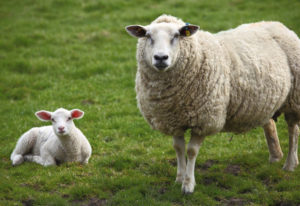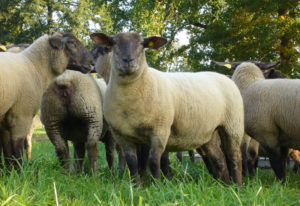Advanced Sheep Breeding Services

It’s that time of year again, the daylight hours are getting shorter, and our sheep advanced breeding services are getting busier. We offer a full range of advanced breeding technologies at Castle Farm Vets, with a fully equipped laboratory at Barnard Castle surgery where sheep artificial insemination (AI) and sheep embryo transfer (ET) and semen collection and freezing can take place. These procedures can also be done on-farm after a discussion with our team.
The advantages of artificial insemination
Artificial insemination (AI) allows a single ram to serve more ewes than he would be able to naturally.
The benefits of sheep AI is that the ewes are synchronised which allows:
- More compact lambing time
- More efficient use of labour
- The production of uniform batches of lambs for shows and sales

Frozen sheep semen
The purchase of frozen sheep semen allows expensive rams to be used to increase the rate of genetic gain and is more cost-effective than purchasing an expensive ram.
Rams anywhere in the country or the world can be used!
The use of frozen sheep semen reduces the reliance on bought in rams therefore reducing the possibility for disease transmission and aids in the management of closed flocks. Rams can be shared over a large geographical area without the need for transport.
The process of the artificial insemination of sheep
AI in sheep is usually performed laparoscopically.
Step 1 – Ewes are synchronised with hormones to ensure they come into season at the same time.
Step 2 – They are starved overnight and on AI day they are loaded into crates.
Step 3 – The vet uses a laparoscope to visualise the uterus through the abdominal wall and injects semen directly into each uterine horn.
Collection of sheep semen
Semen can be collected from your own rams on the day of AI. This is assessed under the microscope to ensure it is of sufficient quality. This can then be diluted and used to inseminate up to 50 ewes from one tup.
It is important to have a backup plan if your chosen tup isn’t good enough – either another tup or frozen semen.
Conception rates for frozen AI are usually 65% + and for fresh AI greater than 70%.
Sheep Embryo Transfer
Embryo transfer allows the production of multiple offspring from elite females within your flock.
Embryo transfer is the process by which fertilised embryos are flushed (removed) from a donor ewe and then transplanted into suitably synchronised recipient ewes to establish a surrogate pregnancy.
What is the process of embryo transfer in sheep?
The donor ewe is treated with hormones so that she produces more eggs than usual at a synchronised mating.
This programme usually lasts 20 days with the ewe being artificially inseminated on day 14, and the six-day-old embryos being flushed from her on day 20.
Flushing is a surgical procedure done through a small abdominal incision under general anaesthetic.
Embryos are then either transferred into prepared surrogate recipient ewes in a process similar to laparoscopic AI, or frozen for future use.
Why freeze sheep embryos?
The ability to freeze embryos means flushing can take place out of the breeding season and a single ewe can be flushed multiple times. Frozen embryos can also be purchased from other breeders and implanted into recipient ewes. Recipient ewes are chosen for their mothering ability and likelihood of being able to give birth naturally.
Embryo transfer is usually done on-site at Barnard Castle, but could be done on-farm if facilities were suitable and there are sufficient numbers of donors
If you are interested in these advanced sheep breeding services please call for more information and advice on 01833 695695.
